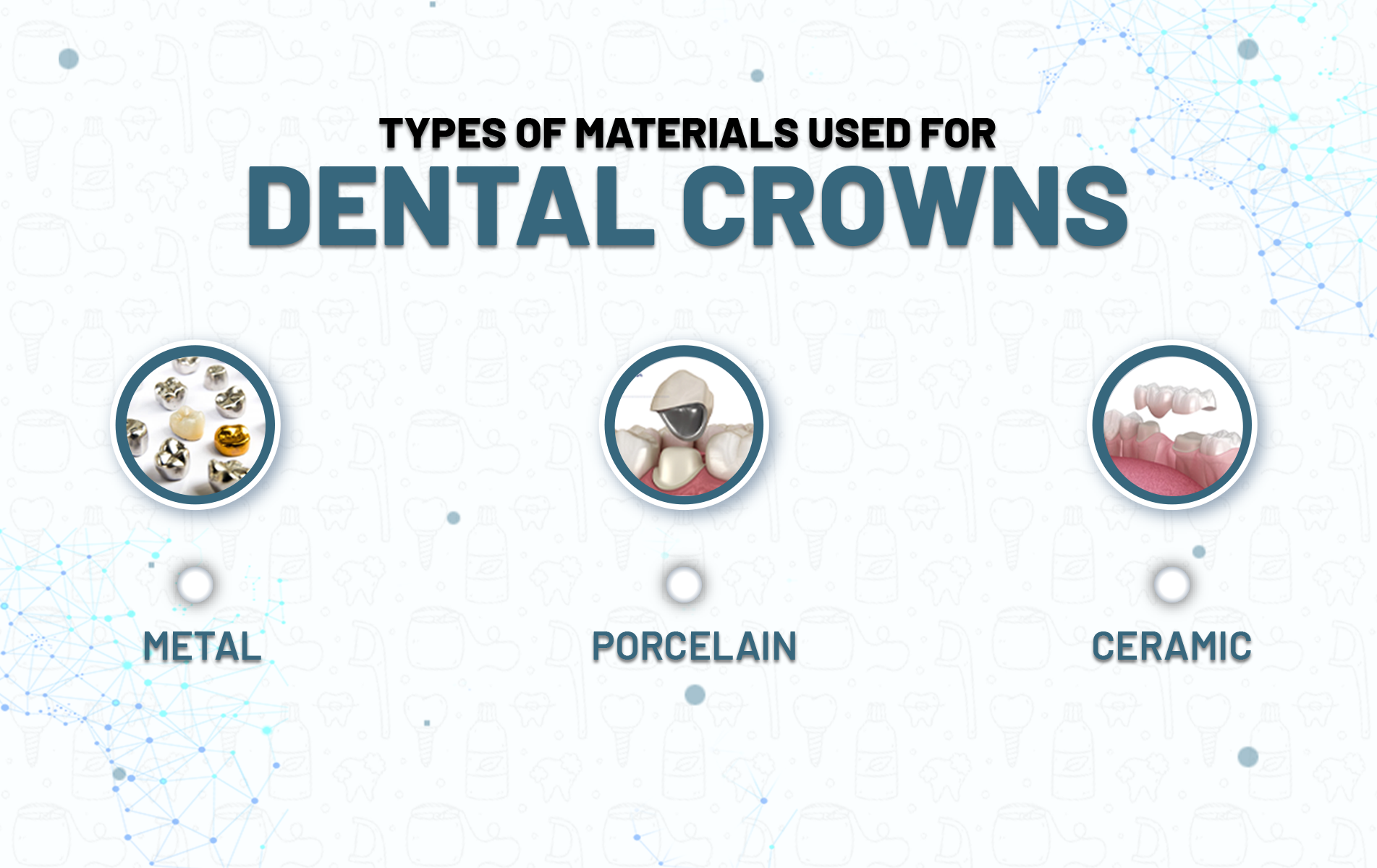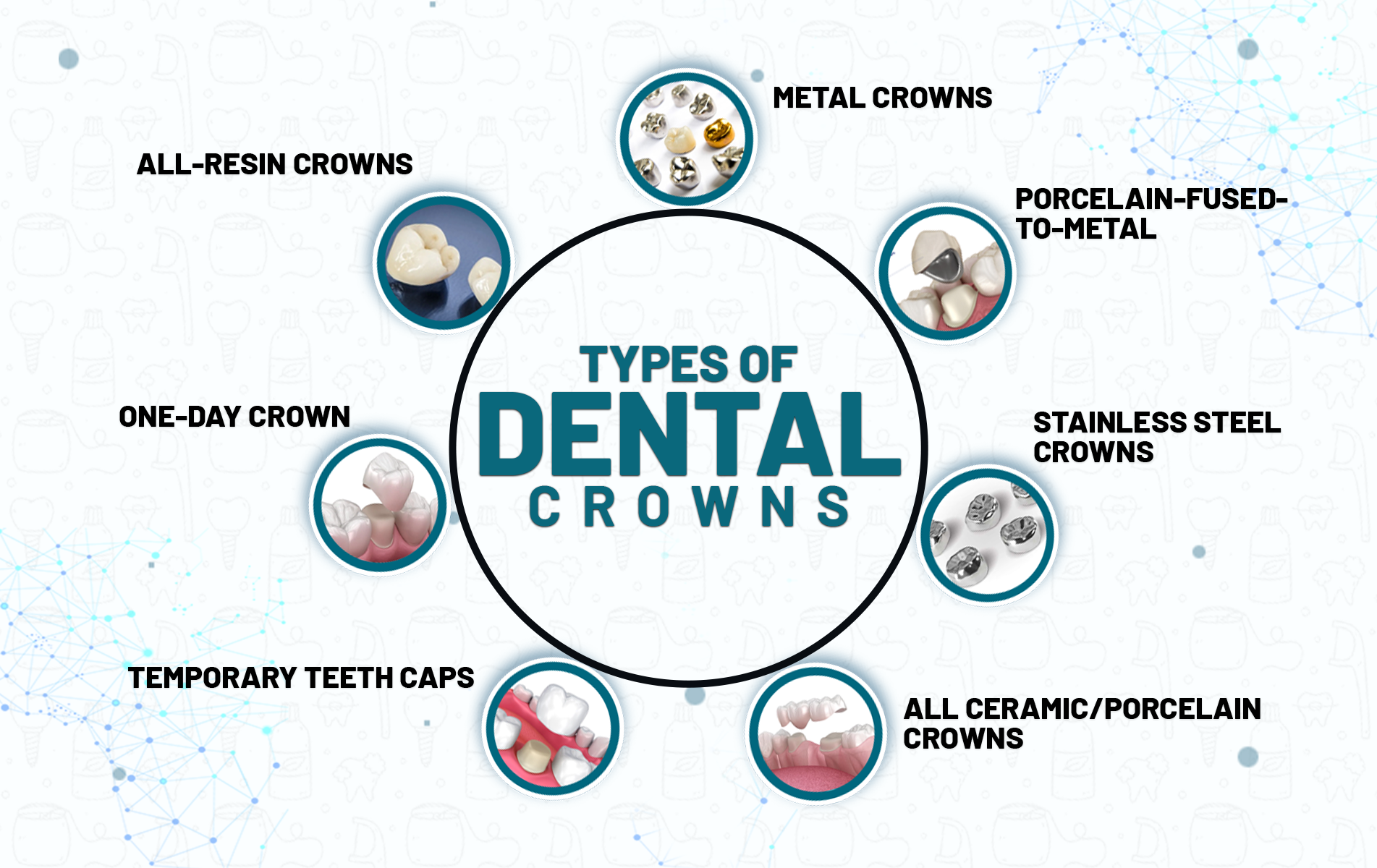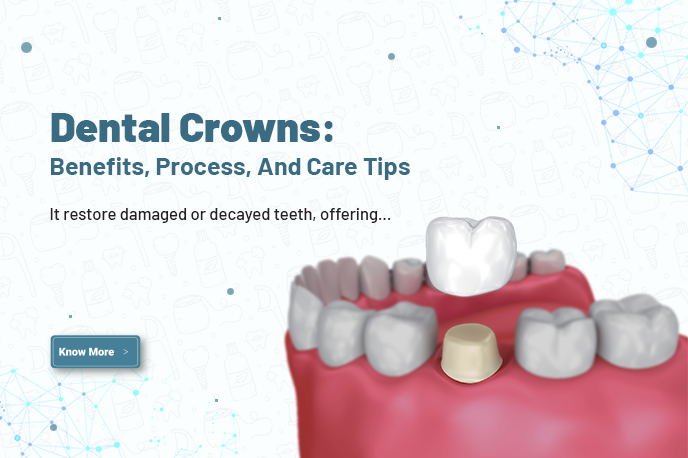A dental crown may be needed when a severe dental cavity threatens the health of a tooth or when a person has a decayed, fractured, lost, or missing tooth that affects their smile and oral functionality.
Dental crowns don’t last forever or a lifetime, taking proper care, and maintaining a good oral hygiene can extend the life of a dental crown.
Importance Of Crowns In Maintaining Oral Health
A dental crown covers a damaged or lost tooth to maintain its shape, size, strength, and overall appearance. Teeths that have undergone root canal treatment are more likely to get fractured and require crown protection.
If you have one or more lost or missing teeth, your dental professional may recommend you get an artificial tooth replacement.
If you have more than one completely decayed, lost, or missing tooth, your dental professional may give you a dental implant on which the crown will be placed.
Definition Of Dental Crowns
Dental crowns are a cap for damaged or decayed teeth restoring its shape, size, and strength. It enhances the appearance of your teeth, and replaces your decayed or lost teeth with new crown teeth.
Dental crown is used beyond aesthetics in maintaining an indvidual’s dental health and oral functionality.
Types Of Materials Used For Dental Crowns

There are three types of materials that are used depending on a patient’s teeth condition, size, and color.
-
Ceramic
It is the best and more suitable options for people who have less space in their mouth for a crown to fit. These crowns are made from a thin material that makes them lighter than other crowns.
-
Porcelain
These crowns mimic the appearance of the tooth enamel more than any other materials used. They are the best crown option for people with metal allergies.
They are more durable than ceramic crowns, and they tend to last longer than others.
-
Metal
Metal crowns can be made up of gold alloy, chromium, and nickel. While using metal crowns, less tooth structure is required to be removed, and they are subject to wear less than any other crowns.
These crowns are relatively more durable, cost effective, and are less likely to chip or break than other crowns.
Differences Between Crowns And Other Dental Restorations
-
Fillings
Fillings are less costly than crowns and are commonly used to treat damaged or decayed teeth. Whereas, a crown is used in more severe conditions.
A filling only treats the affected area, and leaves the other parts of the natural tooth as it is. Fillings can only treat small cracks and it cannot treat large cracks or a severely damaged tooth.
-
Veneers
Veneers only cover the front surface of your tooth that is mainly used for enhancing the appearance of the tooth making it look more aligned, brighter, and shinier.
Whereas, a crowns on teeth covers all the parts of the teeth restoring its function, shape, size, and also to enhance overall dental appearance.
Why Would You Need A Crown?
-
Restoring A Damaged Or Decayed Tooth
A dental crown is a tooth-shaped cap mainly used in restoring a damaged or decayed tooth by removing the damaged or decayed part, shaping the teeth and covering it with a crown that looks exactly like your natural teeth.
-
Protecting A Weak Tooth From Breaking
Dentists also recommend you to get a dental crown to save a weakened, cracked or a severely worn down tooth from breaking by covering it with a teeth-shaped cap.
It prevents a damaged tooth from breaking by covering the tooth and reinforcing its weakened or damaged structure.
-
After Root Canal Therapy
After the Root canal procedure, patients are left with painless and hollowed out teeth because the tooth no longer contains the pulp inside it.
The treated teeth in the back of the mouth, such as (molars and premolars) required extra support because they bear the most bite forces.
Then, a crown is used to support the teeth and ensure that no further damage occurs. You can have teeth crowns before and after root canal treatment.
-
Cosmetic Improvements (tooth shape, size, or color)
Dental crowns are also purely used for cosmetic reasons. Patients who are not happy with the shape, size, and color of your teeth are mostly recommended to get dental crowns.
A dental professional will place a crown to improve the irregularity, size, and color of your teeth for a more aesthetic and perfect smile.
Process Of Getting A Dental Crown
Initially, a dentist will prepare your tooth by removing the upper surface of the teeth to shape it so that it can fit properly under the crown, using a local anesthetic to prevent feeling of pain.
Next, they will take an impression of your tooth using an impression pressed into the mold or by a digital scanner.
The impression will be sent to lab, where a technician will make a crown to fit your tooth, and cover the affected area with a temporary teeth caps.
When the crown will be ready, you will return for your second appointment in which your dentist will fit the crown using a dental cement or an adhesive.
Types Of Dental Crowns
There are several types of crowns for teeth that are available, and the right one for you depends on your personal preference and according to your dental needs.

- Metal crowns
- Porcelain-fused-to-metal (PFM) crowns
- All Ceramic/Porcelain crowns
- All-resin crowns
- One-day crown
- Temporary teeth caps
- Stainless steel crowns
Alternatives To Dental Crowns
There are many alternative treatments of dental crowns that are less costly than crowns and provide the same dental solutions as dental crowns.
These alternative methods are cheaper, but help in treating weak, damaged or decayed teeth restoring their functionality.
-
Onlays
Instead of placing a dental crown, your dentist may preferably use Onlays that are a type of crown that offers protection to teeth but to a smaller degree. It doesn’t require more tooth structure removal than other crowns lowering the risk of complications.
-
Veneers
A dentist may decide to place a veneer depending on the condition of the tooth. Veneers are thin shells that covers the surface of your front tooth typically used for aesthetic reasons.
-
Fillings
A dentist might use fillings, if the tooth has a cavity that can be easily removed and treated with fillings. It is also used to build up a tooth that has been severely damaged by a fracture or decay before covering it with dental crowns.
Pros And Cons of Dental Crowns
Pros
Some of the main advantages of getting crowns are –
-
Restoration Of Function And Strength
Damaged or cracked teeth caused due to cavities can be treated, replaced, and restored to its original condition by getting dental crowns. A crown not only treats damaged teeth, but it also helps in supporting the teeth improving its functionality and strength.
-
Enhanced Appearance
Most people with misaligned or irregular teeth use crowns to enhance their appearance, and to get a more aligned placement of teeth for a perfect, beautiful, and radiant smile.
-
Improved Bites
Crowns also help in improving bites, and speak in patients with damaged, decayed, or misaligned teeth. It bridges the gaps between the teeths due to a lost or missing tooth for a wide and perfect bite.
Cons
The disadvantages of getting dental crowns are –
-
Tooth Enamel Reduction
Getting dental crowns requires reduction of tooth structure or enamel reduction so that the crown can cover the teeth that looks like a natural teeth.
-
Risk Of Nerve Damage
Reduction in tooth enamel causes a higher risk of nerve damage on the inner part of the tooth, causing sensitivity or pain that can be temporary or may require proper treatment to heal.
-
Costly
Dental crowns are much more costly than other alternative treatments such as Fillings, and Veneers. Crowns can range from $800 to $1500 or more depending on the material used to make a crown.
The cost may also rise if the dentist has to perform more extensive prep work before putting crowns.
FAQ
Will I feel pain after getting a crown?
Yes, you may experience some level of pain and discomfort after getting a dental crown, but the pain lasts for a few days.
How do I know if my crown needs replacement?
You must replace your dental crowns if you experience persistent pain, swelling, and sensitivity around your teeth or if your crown is loose, cracked, or chipped.
Can You Whiten Crown Teeth
No, you cannot whiten dental crowns because they are made up of materials that do not respond to whitening treatments.
How Long Do Crowns Last On Front Teeth
Crowns typically last between 5 – 15 years, but with good oral hygiene and dental care some last longer than that.
Conclusion
Metal crowns may be a good option for you if you’re looking for a durable, and natural-looking crown, and don’t want to wait for weeks to get it.
Talk to a dentist about your preferences and discuss whether this method is good for your oral health and if it fits your budget.


Write Reviews
Leave a Comment
No Comments & Reviews